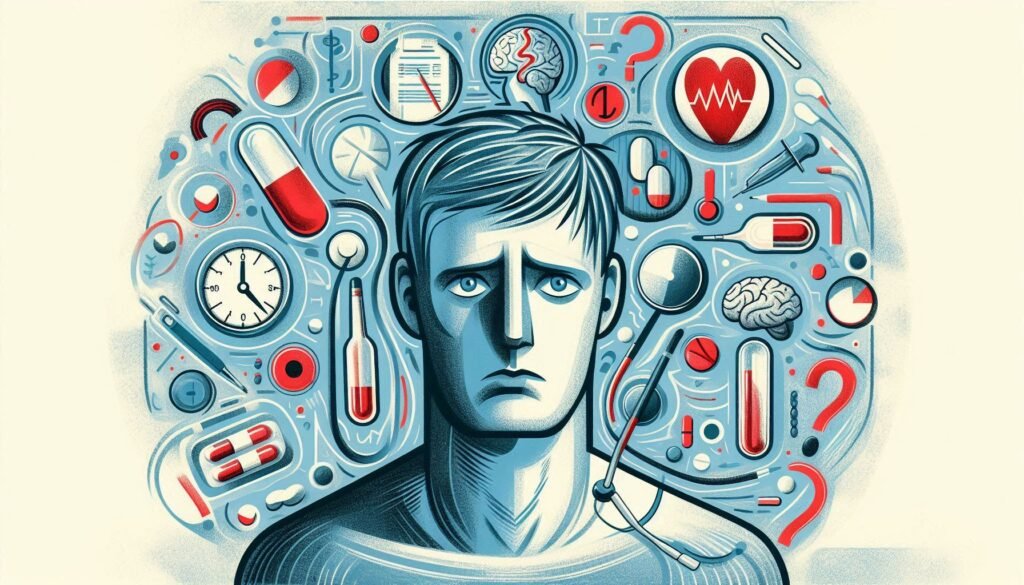Health anxiety often thrives in the shadows of our minds, fueled by a complex interplay between personality traits and perceptions of well-being. Among these traits, neuroticism stands out as a significant player in shaping how we experience health concerns. For those prone to hypochondria—now recognized as Illness Anxiety Disorder—the sensations of discomfort can escalate into overwhelming fears about serious illnesses.
But what drives this intense preoccupation with health? Is it simply an overactive imagination or something deeper rooted in personality? As we delve into the fascinating world where neuroticism meets hypochondria, we’ll uncover how certain psychological patterns contribute to heightened health anxiety. From cognitive distortions to symptom perception, every aspect paints a vivid picture of why some individuals find themselves ensnared in cycles of worry about their health.
Join us on this exploration as we unravel the connections between neuroticism and hypochondria while providing insights that could lead to better understanding and management of health-related anxieties. Whether you’re grappling with your own worries or seeking clarity for someone else’s experiences, there’s much to learn from this intersection of psychology and wellness.

Illness Anxiety Disorder: Understanding the Evolution from Hypochondria to Modern Diagnosis
Illness Anxiety Disorder (IAD) has evolved significantly from its earlier classification as hypochondria. Historically, individuals expressing excessive worries about health were often dismissed or ridiculed. The term “hypochondriac” was frequently used to describe anyone preoccupied with the fear of having a serious illness.
With advancements in psychology and diagnosis, IAD emerged as a more nuanced understanding of these concerns. It’s now recognized that this disorder transcends mere worry; it involves an intense focus on bodily sensations that can lead to significant distress. Modern diagnostic criteria emphasize the importance of both cognitive aspects and emotional responses related to health fears.
People with IAD may misinterpret benign physical symptoms as signs of severe illness, leading to increased anxiety and compulsive behaviors like frequent doctor visits or extensive online searches for information. This evolution reflects a broader understanding of mental health conditions, recognizing how deeply interconnected our thoughts and feelings are regarding well-being.
The shift towards viewing hypochondria through the lens of IAD marks an essential step in addressing not only symptoms but also underlying psychological factors influencing these anxieties.
The Neuroticism-Hypochondria Connection: How Personality Shapes Health Anxiety
Neuroticism is a personality trait characterized by emotional instability and heightened sensitivity to stress. Individuals high in neuroticism often experience anxiety, mood swings, and fear of negative outcomes. This predisposition makes them more susceptible to health-related worries.
Hypochondria, or illness anxiety disorder, closely relates to neuroticism. People with high neurotic traits may interpret bodily sensations as signs of serious illness. Their tendency to ruminate on these thoughts can lead to excessive worry about their health.
These individuals often engage in behaviors that amplify their anxieties, such as frequent doctor visits or unnecessary medical tests. The cycle of seeking reassurance only reinforces their fears, creating an ongoing struggle with health anxiety.
Moreover, the interplay between neuroticism and hypochondria can result in significant distress and impairment in daily life activities. Understanding this connection helps illuminate why certain individuals become preoccupied with their health while others remain unaffected by similar symptoms.
Cognitive Distortions: Catastrophizing and Health-Related Thoughts in Neurotic Individuals
Cognitive distortions play a significant role in shaping the health-related thoughts of neurotic individuals. One common distortion is catastrophizing, where a person imagines the worst possible outcome from minor symptoms or situations. This thought pattern can lead to increased anxiety and fear about health.
For someone high in neuroticism, even a simple headache might trigger thoughts of serious illness. They may jump to conclusions without considering medical evidence or alternative explanations for their discomfort. Such thinking amplifies worries and often leads to excessive searching for reassurance.
Neurotic individuals are also prone to overgeneralization. They may take one negative experience with an ailment as proof that they will always face severe health issues. This can create a cycle of worry that feels impossible to break.
In this context, cognitive behavioral therapy (CBT) techniques can be beneficial by helping these individuals identify and challenge their irrational beliefs about health. Understanding how these distortions operate is crucial for managing anxiety surrounding personal well-being.
Symptom Perception: Neuroticism’s Role in Amplifying Physical Sensations
Neuroticism significantly influences how individuals perceive physical sensations. Those high in neurotic traits are more likely to focus on bodily cues and interpret them through a lens of anxiety. This heightened awareness can lead to misinterpretation of normal bodily functions as serious health issues.
For instance, a simple headache might be perceived as a sign of something much worse, triggering worry and stress. This cycle not only amplifies the sensation but also creates an emotional response that further heightens discomfort.
Moreover, neurotic individuals may dwell on past experiences or health concerns, which adds another layer of anxiety to their symptom perception. Their tendency towards negative thinking often exacerbates feelings of vulnerability regarding health.
As they become increasingly sensitive to their bodies’ signals, even minor symptoms can feel overwhelming. Understanding this connection between neuroticism and symptom perception is crucial for addressing health anxiety effectively.
Health Information Seeking Behavior: Impact of Neurotic Traits on Medical Research
Individuals high in neuroticism often engage in extensive health information-seeking behaviors. This tendency can lead them down a rabbit hole of anxiety and misinformation. When faced with physical symptoms, they may compulsively search online for answers, amplifying their worries rather than alleviating them.
Research shows that neurotic individuals are more likely to interpret benign sensations as severe illnesses. This misperception drives them to seek out medical literature or forums obsessively. Unfortunately, this cycle reinforces their fears and misconceptions about health.
Moreover, the nature of the information found online can be detrimental. Many websites present exaggerated claims or anecdotal evidence that further fuels health anxiety among neurotic individuals. The quality of available information becomes crucial in shaping their perceptions.
Healthcare providers need to understand this behavior when interacting with patients exhibiting high levels of neuroticism. Tailoring communication strategies could help mitigate misunderstandings and promote healthier coping mechanisms for managing concerns about personal health.
Medical Interactions: How Neuroticism Affects Patient-Healthcare Provider Relationships
Neuroticism can significantly influence how patients interact with healthcare providers. Individuals high in neurotic traits often experience heightened anxiety, which may lead to miscommunication during medical visits. This anxiety can cause them to focus excessively on potential health issues rather than their current symptoms.
Moreover, neurotic patients might express skepticism toward their doctor’s advice or treatment plans. They are prone to doubt the efficacy of prescribed medications and may seek multiple opinions, creating a cycle of insecurity and distrust in the healthcare system.
Additionally, these individuals tend to exaggerate minor symptoms due to their underlying health anxieties. This behavior can lead doctors to spend more time addressing unfounded concerns instead of focusing on genuine health needs.
The combined effect is a strained patient-provider relationship where both parties feel frustrated. Understanding this dynamic is crucial for fostering better communication and improving health outcomes for those grappling with neuroticism and hypochondria.
Digital Health Anxiety: Cyberchondria and Online Symptom Checking in the Modern Age
The rise of the internet has transformed how people seek health information. For many, this means turning to online resources for answers about symptoms and diseases. However, this practice can sometimes lead to increased anxiety rather than relief.
Cyberchondria describes a phenomenon where individuals develop heightened health anxiety after searching for medical information online. The vast amount of data available can often be overwhelming, leading users to misinterpret benign symptoms as serious conditions.
Neuroticism plays a crucial role in this behavior. Those high in neurotic traits may be more susceptible to interpreting vague or unrelated findings as confirmation of their worst fears. This cycle fuels ongoing worry and compulsive checking behaviors.
Moreover, social media exacerbates these issues by amplifying stories about illnesses and treatments that may not accurately represent reality. Individuals with higher levels of neuroticism might find themselves caught in an endless loop of research and fear-driven self-diagnosis through digital platforms.
Coping Mechanisms: Adaptive and Maladaptive Strategies for Managing Health Concerns
Coping mechanisms play a crucial role in how individuals manage health anxiety related to neuroticism and hypochondria. Adaptive strategies can include mindfulness, cognitive restructuring, and engaging in physical activity. These approaches help individuals ground themselves and reduce their focus on perceived threats.
On the other hand, maladaptive coping strategies often exacerbate anxiety. Common examples include avoidance behaviors or excessive reassurance-seeking from friends or healthcare providers. This reliance on others for validation can lead to more stress instead of relief.
Another maladaptive tactic is catastrophizing health symptoms. Individuals may jump to worst-case scenarios without proper medical evidence, which fuels their anxiety further. These thought patterns create a vicious cycle that reinforces fears about illness.
Recognizing these coping strategies is essential for managing health concerns effectively. By fostering adaptive methods while addressing maladaptive ones, individuals can develop healthier responses to their worries about health.
Evidence-Based Treatments: Cognitive Behavioral Approaches for Neurotic Health Anxiety
Cognitive Behavioral Therapy (CBT) is a leading evidence-based treatment for individuals grappling with neuroticism and hypochondria. This therapeutic approach focuses on identifying and changing negative thought patterns that fuel health anxiety. By addressing these cognitive distortions, patients can learn to interpret their physical sensations more rationally.
Exposure therapy, often used within CBT frameworks, helps patients confront their fears gradually. This method encourages individuals to face situations or thoughts they typically avoid due to anxiety, promoting desensitization over time. As clients become accustomed to these triggers, their overall fear diminishes.
Mindfulness techniques are also integrated into CBT for health anxiety management. These practices help individuals stay grounded in the present moment instead of spiraling into catastrophic thinking about potential illnesses. Mindfulness empowers them to observe their thoughts without immediate judgment or panic.
Research supports the efficacy of CBT in reducing symptoms associated with both neuroticism and hypochondria. Many find lasting relief through this structured and supportive approach tailored specifically for managing health-related concerns.
Quality of Life: Balancing Health Vigilance with Emotional Well-being
Balancing health vigilance with emotional well-being is crucial for individuals grappling with neuroticism and hypochondria. While it’s natural to be concerned about one’s health, excessive worry can detract from the quality of life.
Finding that balance involves developing self-awareness about one’s thoughts and feelings related to health concerns. Mindfulness practices can help ground individuals, allowing them to recognize when anxiety spirals out of control. Learning to differentiate between genuine symptoms and exaggerated fears fosters a healthier mindset.
Additionally, establishing boundaries around medical information consumption is vital. Limiting time spent searching online for health-related topics reduces unnecessary panic triggered by cyberchondria. Instead, focus on reliable sources when questions arise.
Engaging in activities that promote physical and mental wellness—such as exercise, socializing, or pursuing hobbies—can also contribute positively to overall well-being. By prioritizing these strategies alongside regular check-ups with healthcare providers, individuals can cultivate a more balanced approach toward their health while maintaining emotional stability.
Awareness and proactive coping mechanisms pave the way for improved mental resilience against anxiety related to neuroticism and hypochondria.


